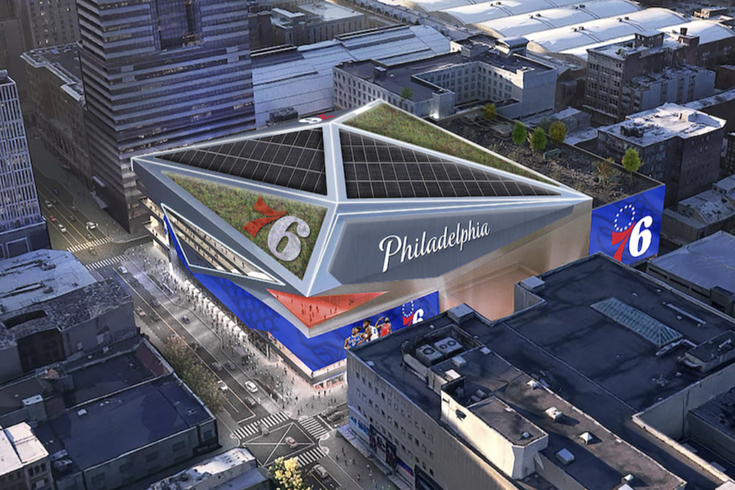
January 10, 2023
 PHILADELPHIA 76ERS/76PLACE.COM
PHILADELPHIA 76ERS/76PLACE.COM
Chinatown business and community leaders have formed a coalition to stop the Philadelphia 76ers from building a proposed arena in Center City, shown in the rendering above on Market Street between 10th and 11th streets.
A group of 41 organizations in Chinatown are banding together in opposition to the Philadelphia 76ers plan to build their new arena in Center City.
After months of pushback separately, business and community leaders have organized in single group that is being called the Chinatown Coalition to Oppose the Arena. The new group will pursue its own impact studies regarding plans for 76 Place at Market East, the team's $1.3 billion, privately funded proposal for 10th and Market streets.
The location of the stadium would be between 10th and 11th streets and from Market Street north to Cuthbert Street, which is the southern end of Chinatown. Construction of the arena would involve the demolition of a portion of the Fashion District Philadelphia mall.
Chinatown is a community that previously resisted plans to build a Phillies ballpark and a casino in the neighborhood.
“We are very clear that this proposed arena would destroy Chinatown, that is why we are forming this coalition of 41 organizations, and why 90 businesses have signed a petition formally opposing the proposal," Steven Zhu, president of Chinese Restaurant Association of Greater Philadelphia, said Monday. "Our community has been here for 150 years, and we’re not stupid. We know this is a land grab. We know the billionaire developers’ interest is in taking our land and erasing our community.”
The Chinatown coalition has brought in the Asian American Legal Defense and Education Fund to be its legal muscle in the impending battle. The New York City-based law firm on Monday called the fight against the arena a matter of protecting the community's safety and traditions, and it pointed to a climate of anti-Asian violence in recent years.
"Chinatowns across the country became neighborhoods where Asian Americans could protect the community and survive through social networks, social services, affordable housing, and economic opportunity," AALDEF senior counsel Elizabeth Koo said in an emailed statement. "The proposed arena would harm Chinatown and the entirety of Philadelphia. We pledge our commitment to support the Coalition and keep our communities safe and vibrant.”
76 Devcorp, the development arm behind the NBA team's plan in Center City, proposed the new arena last July. The team vowed to engage with the Chinatown community on issues such as public safety, vehicle and pedestrian traffic, construction, and the economic consequences of building an entertainment complex next-door to a neighborhood that has historically been overrun by transportation projects and encircled by the development of Center City.
The Sixers are hoping to have zoning permits in place by this summer and have set a target date of 2031 to open the proposed arena.
Led by real estate developer and chairman David Adelman, 76 Devcorp says it has spent months gathering public feedback on the proposal, including at the first community meeting in December that flashed hints of a formidable opposition growing against the arena. Many storefronts in Chinatown now have signs in their windows that read, "No Stadium," and local discussion about how to block the plan has picked up over the last month.
“As we have been doing since last summer, we will continue to meet with community stakeholders to discuss the facts surrounding the proposed arena and how it will positively impact the area around Market East in Center City and across Greater Philadelphia," Nicole Gainer, a spokesperson for 76 Devcorp, said Monday.
The proposed arena would have a capacity of more than 18,000, less than the 20,400-seat capacity for Sixers games at the Wells Fargo Center in South Philadelphia. The team currently leases the Wells Fargo Center from Comcast Spectator, which has invested more than $400 million into arena renovations as part of a push to keep the Sixers at the sports complex.
Proponents of the new arena say it will create some 9,000 construction jobs and generate $400 million in annual economic output. The developers anticipate that the arena would operate about 150 days per year, typically at night for Sixers games and other events, and it would connect to the remaining portion of the mall on Market Street. On event nights, the Sixers envision closing Filbert Street between 10th and 11th streets for a pedestrian concourse that would encompass the site of the existing Greyhound bus station.
Larger questions about stadium accessibility, public transit and parking remain to be thoroughly analyzed and presented by the developers. In November, Adelman remarked that he expects Sixers fans to have access to 29 parking garages with more than 9,000 spaces. The team ultimately hopes that public transit would become the primary method of travel for people attending games. The proposed arena site sits above SEPTA's Market-Frankford Line subway and within close proximity of Jefferson Station, one of the city's busiest Regional Rail stops.
76 Devcorp says it has undertaken its own community impact studies and aims to iron out a community benefits agreement through the creation of the Chinatown Steering Committee, which is part of the Philadelphia Chinatown Development Corp. The selection process for the steering committee has been criticized by opponents of the stadium, who believe opposing viewpoints are being held out of the process in order to present a more favorable reception to the arena proposal.
"Every generation in Chinatown’s existence has fought tooth and nail for our right to maintain the home that we have created for ourselves," said Selena Yip, executive director of the Philadelphia Asian American Film Festival. "We will not allow billionaire developers to determine what happens in our neighborhood."
A spokesperson for the Chinatown Steering Committee did not return a call on Monday.
The Chinatown Coalition to Oppose the Arena streamed its Monday morning meeting on Instagram Live at Tom's Dim Sum, at 59 N. 11th St.